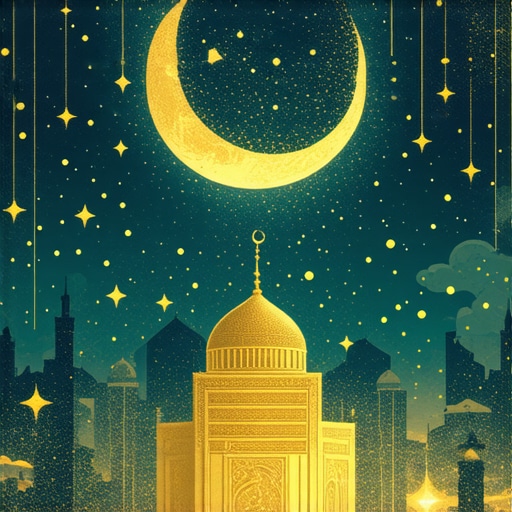My Personal Journey with Bushra in Islam
Ever since I experienced my first dream filled with bright, uplifting messages, I became deeply curious about the spiritual significance of such dreams. These moments of divine communication, known as Bushra, or glad tidings, are believed to be signs of Allah’s mercy and encouragement. Sharing this personal insight, I found that understanding dreams of good news can strengthen our faith and give us hope during challenging times.
Understanding the Meaning Behind Your Dreams of Good News
In Islamic tradition, dreams that bring positive messages or good news are often seen as divine blessings. They serve as a reminder that Allah is watching over us and that our efforts in faith are recognized. When I dreamt of a peaceful garden, I felt an overwhelming sense of tranquility, which I later learned could symbolize spiritual growth and divine approval, aligning with teachings from Islamic dream interpretations.
What Does It Mean When You Dream of Good News?
Dreams of good news can vary widely, but they often point to upcoming blessings, success, or divine favor. These dreams are considered positive signs indicating that Allah’s mercy is near. For example, if you dream of hearing joyful news about health or prosperity, it might reflect your inner hope and faith that better days are ahead. According to renowned scholars, such dreams reinforce the importance of patience and trust in Allah’s plan.
Can Dreams of Good News Be a Sign of a Future Blessing?
Absolutely. Many scholars interpret these dreams as preludes to real-world blessings. They act as divine whispers, guiding us to stay steadfast in our faith and good deeds. However, it’s essential to interpret dreams within the context of Islamic teachings and personal circumstances. For a deeper understanding, refer to this detailed guide on true dreams in Islam.
If you’ve experienced dreams of good news, I encourage you to reflect, pray, and seek Allah’s guidance. Sharing your experiences can also inspire others on their spiritual path. Feel free to comment below or explore more about dream interpretations to deepen your understanding of divine messages.
The Sacred Language of Dreams in Islam: Unveiling Divine Messages
Dreams in Islam are more than mere subconscious reflections; they are considered sacred messages from Allah, often encoded with divine wisdom and guidance. Understanding these messages requires a nuanced approach, combining knowledge of sacred symbols, Quranic references, and prophetic traditions. For instance, seeing the Kaaba in a dream symbolizes spiritual closeness to Allah and a reminder to strengthen faith. Interpreting such dreams can help believers navigate life’s challenges with divine insight.
The Art of Recognizing Authentic Dreams: A Guide for Believers
Not all dreams hold sacred significance; distinguishing true, divine dreams from Shaytani (Satanic) visions is crucial. According to Islamic scholars like Ibn al-Qayyim, authentic dreams often come with a sense of peace, clarity, and align with Islamic teachings. Conversely, Shaytani dreams tend to invoke fear, confusion, or negative emotions. To deepen your understanding, exploring principles outlined in principles of dream interpretation in Islam can be invaluable. These principles emphasize sincerity, prayer, and consulting knowledgeable scholars for accurate guidance.
Deciphering Sacred Symbols: What Do Common Dream Elements Signify?
Many dreams feature symbols like animals, colors, or objects that carry profound meanings. For example, dreaming of a green color often symbolizes divine blessings, growth, and paradise. Similarly, encountering a dog might have varied interpretations based on context, but generally, it could represent loyalty or protection. Recognizing these symbols within the framework of Quranic verses and prophetic traditions enhances the accuracy of their interpretation.
Practical Steps to Enhance Your Dream Interpretation Skills
Developing the ability to interpret dreams accurately involves continuous learning and spiritual practice. Start by maintaining a dream journal, noting details, feelings, and symbols. Engage in prayers for divine guidance before sleep, asking Allah for clarity. Studying classical texts like Al-Muntakhab al-Kalam and consulting with knowledgeable scholars can deepen your understanding of sacred symbols. Remember, patience and sincerity are vital—dreams are a means of divine communication, but their true meanings often unfold over time.
Have you ever experienced a dream that seemed to carry a divine message? What steps did you take to interpret it correctly?
For further reading, exploring resources like dreams about losing teeth can offer insights into subconscious fears and divine warnings, enriching your interpretative skills. Embracing this sacred knowledge not only enhances spiritual growth but also strengthens your connection with Allah’s divine wisdom.
Unveiling the Mysteries of Sacred Symbols Through Personal Experience
As I delved deeper into the realm of Islamic dream interpretation, I realized that each symbol carries a layer of divine wisdom that often reveals more than meets the eye. For instance, my own experience of dreaming about the Kaaba was not just a visual; it was a profound reminder of my spiritual closeness to Allah, urging me to renew my faith and dedication. Such symbols, rooted in Quranic verses and prophetic traditions, act as divine signposts guiding us through life’s uncertainties.
The Complexity of Symbols: Beyond the Surface
Symbols like animals, colors, or objects in dreams often seem straightforward but harbor complex spiritual meanings. For example, dreaming of a green color can symbolize divine blessings and paradise, yet it also challenges us to reflect on our inner growth and spiritual health. Recognizing these symbols requires a nuanced understanding, blending personal intuition with scholarly knowledge. I remember a dream where I saw a snake, which initially evoked fear, but upon reflection and consulting trusted sources like Islamic interpretations of snakes, I understood it as a warning to stay vigilant against hidden dangers.
< >
>
Why Are Some Symbols More Sacred Than Others?
From my experience, certain symbols like the Prophet’s companions or the earthquake often carry a higher degree of sacredness, acting as direct messages from Allah or His prophets. These dreams demand more careful interpretation, often involving prayer and consultation with knowledgeable scholars. I recall a dream where I saw the Prophet Muhammad (peace be upon him), which profoundly impacted my spiritual journey, reinforcing the importance of divine guidance through dreams.
How Can We Deepen Our Understanding of Sacred Symbols?
Developing a more refined ability to interpret these symbols involves continuous learning and sincere supplication. I personally keep a dream journal, regularly noting symbols, feelings, and contextual details, then cross-referencing with trusted texts like Tafsir al-Ahlam. Engaging in prayers for divine guidance before sleep also enhances clarity. I encourage you, dear reader, to share your experiences or ask questions—your insights might unlock further divine secrets for yourself and others on this spiritual path.
Unveiling the Layers of Sacred Symbols in Islamic Dream Interpretation
As I delved deeper into the intricate world of Islamic dream symbolism, I discovered that each symbol is like a divine code, carrying layers of spiritual significance that often go beyond the surface. For instance, encountering the earthquake in a dream might initially evoke fear, but it can also symbolize a profound divine shift or spiritual awakening. Recognizing these symbols requires a blend of scholarly knowledge and personal spiritual intuition, which I have cultivated over years of study and reflection.
How Do Sacred Symbols Reflect Personal Spiritual States?
In my experience, symbols like water, fire, or animals serve as mirrors of our inner spiritual condition. For example, dreaming of Prophet Musa or Moses signifies divine guidance and the importance of patience and perseverance in the face of trials. These symbols often align with Quranic verses and prophetic traditions, providing a sacred language that helps us understand our spiritual journey. Recognizing this language has profoundly enhanced my ability to interpret dreams with clarity and confidence.
What Makes Certain Symbols More Sacred Than Others?
From my perspective, symbols associated with the Prophets, angels, or divine signs tend to carry a higher degree of sacredness. Dreaming of the Kaaba or Prophet Muhammad (peace be upon him) are considered direct messages from Allah, demanding careful reflection and often, consultation with knowledgeable scholars. These dreams serve as spiritual milestones, guiding us toward greater faith and righteousness. To deepen our understanding, engaging with authoritative texts like Tafsir al-Ahlam is invaluable, as it provides detailed insights into these sacred symbols.
How Can We Develop a More Nuanced Approach to Sacred Symbols?
Developing expertise in interpreting sacred symbols involves continuous learning, sincere supplication, and experiential practice. I maintain a detailed dream journal, noting not only symbols but also feelings and contextual details, which I then cross-reference with trusted scholarly sources. Engaging in prayers for divine guidance before sleep enhances clarity and receptivity. Remember, patience and sincerity are key—each dream is a divine message waiting to be unraveled. I invite you to share your experiences or ask questions, as collective wisdom can often unlock deeper layers of understanding.
Can Sacred Symbols Reveal Hidden Aspects of Divine Will?
Absolutely. Sacred symbols often serve as windows into the divine plan, revealing aspects of Allah’s wisdom that are otherwise concealed. For example, a dream involving Prophet’s companions can symbolize divine guidance through righteous companionship and community. Interpreting these symbols requires a sensitive, scholarly approach combined with spiritual intuition. The more we deepen our understanding of these sacred signs, the better equipped we are to align our lives with divine will. I highly recommend exploring authoritative resources and personal reflection to refine this sacred skill.
Would You Like to Explore Your Sacred Dreams with Greater Precision?
If you are eager to enhance your ability to interpret sacred symbols and understand divine messages through dreams, I encourage you to immerse yourself in both scholarly texts and personal reflection. Developing this skill not only enriches your spiritual life but also strengthens your connection with Allah’s divine wisdom. Feel free to reach out with your experiences or questions—I am here to guide you on this sacred journey of discovery.
Things I Wish I Knew Earlier (or You Might Find Surprising)
1. The Power of Personal Reflection
Looking back, I realize how much more I could have understood about my dreams if I had kept a detailed journal from the start. Recording feelings, symbols, and contexts helped me see patterns and divine messages more clearly, making my spiritual journey richer and more insightful.
2. Not All Dreams Are Sacred
It’s easy to get caught up in interpreting every dream as divine, but I’ve learned that distinguishing authentic, sacred dreams from Shaytani visions requires careful prayer and consultation with knowledgeable scholars. This awareness saved me from unnecessary confusion and fear.
3. Symbols Are Multi-layered
Dream symbols often carry multiple meanings depending on context. For example, dreaming of water can symbolize purity or divine blessing, but also purification of sins. Reflecting on personal circumstances is key to accurate interpretation.
4. The Role of Sincerity and Supplication
Before sleeping, sincere prayer for guidance can open the door to clearer divine messages. I’ve found that asking Allah for understanding helps me interpret dreams with more confidence and peace.
5. Sacred Symbols Are Context-Dependent
Seeing the Kaaba or Prophet Muhammad (peace be upon him) in dreams is especially sacred, but their meanings vary. Consulting trusted texts and scholars deepens understanding of these divine signs.
6. Patience Is Essential
Sometimes the true meaning of a dream unfolds over time. Rushing for immediate answers can lead to misinterpretation. Patience and ongoing learning are vital.
Resources I’ve Come to Trust Over Time
- Islamic Dream Interpretation by Ibn al-Qayyim: This classic text offers profound insights into dream symbolism, guiding me to interpret dreams within Islamic teachings.
- Al-Muntakhab al-Kalam: A comprehensive collection of dream interpretations that helped me understand complex symbols better.
- Islamic Dream Dictionary: An accessible resource for quick reference, making it easier to recognize common symbols in dreams.
- Scholarly Articles and Forums: Engaging with knowledgeable scholars and community discussions has enriched my understanding and provided diverse perspectives.
Parting Thoughts from My Perspective
Dream interpretation in Islam is a sacred art that bridges our subconscious with divine guidance. Through personal reflection, sincere supplication, and trusted resources, we can better understand the messages Allah sends us in our dreams. Remember, patience and humility are key—each dream is an opportunity to grow closer to Allah and deepen our faith. If this resonates with you, I’d love to hear your experiences or thoughts. Feel free to share, and may Allah bless your spiritual journey.


